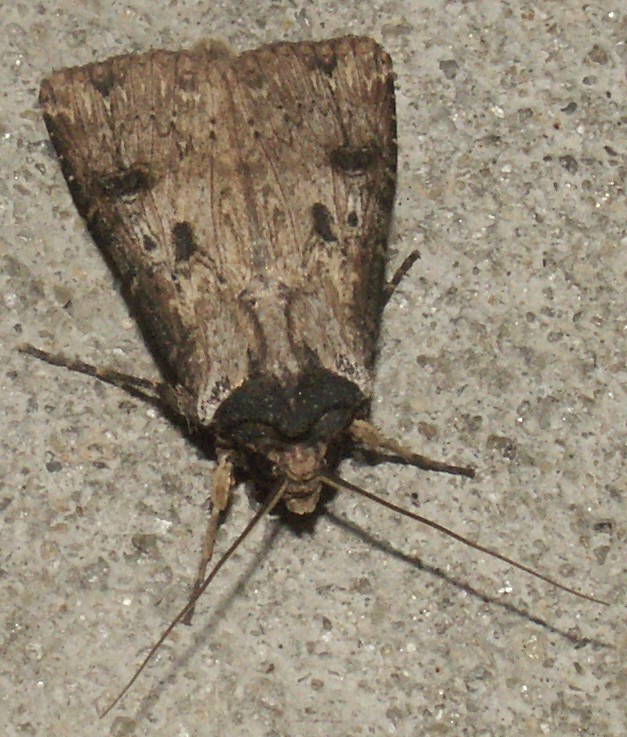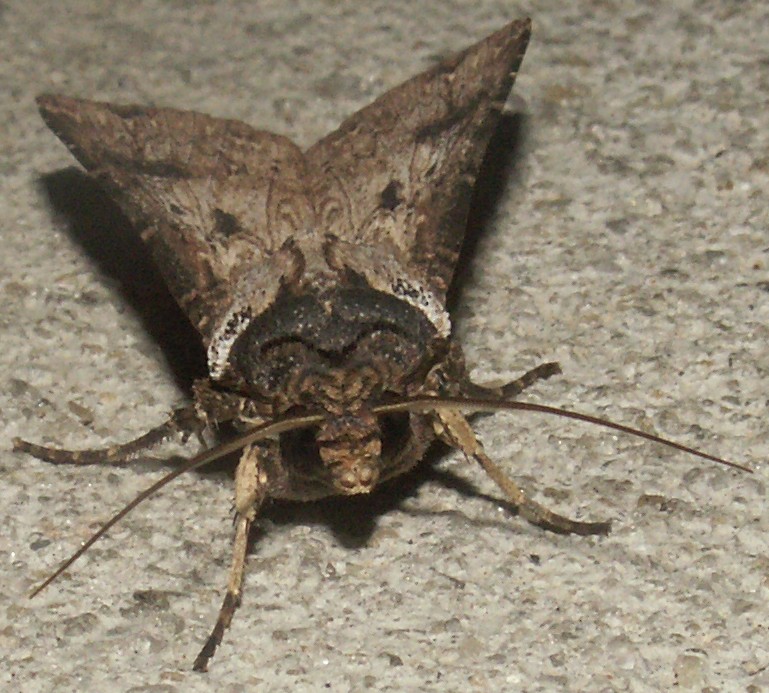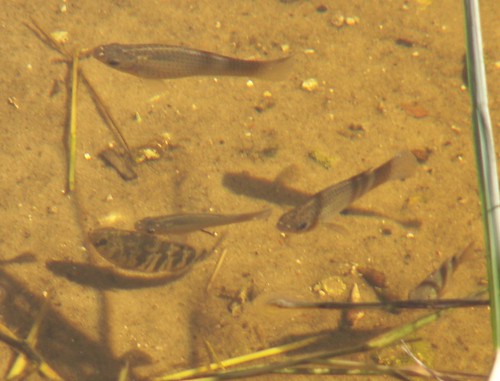A Philosophy of Critters (updated with species ID)

Large view
I was very lucky to catch this little one in mid-takeoff on Saturday. Mary had spotted it on the sidewalk around the corner from the supermarket and called me back as we hauled groceries home. My guess is it's some kind of an Owlet Moth (Family Noctuidae), but I've made an ID request at Bugguide.Net and am waiting for any further info....

Large view

Large view
Update, 30 November 2006: Thanks to Jan Metlevski at Bugguide.Net for identifying this as Agrotis malefida, also known as the Rascal Dart. Family Noctuidae (Owlet Moths), Subfamily Noctuinae (Cutworm or Dart Moths).
According to Bugguide, these moths range throughout the southern half of the U.S. and stray in the northeast to New York. They also range through Mexico and Central and South America to Argentina and Chile. Larvae are also called "pale-sided cutworm" and "rugged cutworm".
I photographed this one outside Bugguide's stated flight season of April to October. That fact made me check the Moth Photographers Group page to compare malefida with the very similar Agrotis apicalis, which seems to range only within Florida and Cuba. After poring over wing and thorax markings for both, I found enough differences to lead me to agree with Metlevski.
I also finally uploaded the videos I took of the "mini-fish" and "micro-fish" (Mary's term, pronounced "microfiche") that we spotted on the University of Tampa campus back in October:
Mini-Fish:
Here's the still shot:

Micro-Fish:
I couldn't get a decent still shot of the micro folk.
I finally saw March of the Penguins (U.S. TV premier on Hallmark Saturday night), and was struck -- not for the first time -- about how, thank goodness, science is finally recognizing that animals have emotion and intelligence. A similar viewpoint is evident in the article, "Why Chickens Like Pretty Girls...and other bizarre animal stories" in today's Parade magazine. (Full text will be available online on the 28th.)
Used to be animals were seen as "dumb", "unemotional", and "incapable of feeling pain." Any argument to the contrary created a hue and cry in the scientific community that one was anthropomorphizing the beasts.
News flash: Humans are animals. We're sophisticated beasts, perhaps, but deep down inside we're still beasts. We deal with instinct, suppressed or not, just as other animals do.
The whole concept of anthropomorphizing becomes pretty much a moot point for me. I assume our cats felinomorphize us, because that's their frame of reference. Sure, there are behavioral differences between, say, myself and the moth above -- and I assume I was being lepidopteromorphized by the moth because that's its frame of reference. That doesn't mean the thing isn't intelligent or doesn't have feelings -- it means its intelligence and feelings follow a different trajectory than my own.
With the help of advances in monitoring technology, scientists are now "discovering" that animals are "more human." As I see it, empirical evidence is just now starting to catch up with common sense (dare I say "horse sense"?). I turn it around: as much as animals are becoming "more human," humans are beginning to realize that we're "more animal."
The more we learn about our place in the Kingdom of Animalia and the more types of monitoring we can do, the more ethical questions that knowledge will raise. For example, Bryon E. Petersen's work, profiled in John Barry's "From mice to men" in last Tuesday's St. Petersburg Times, carries extraordinary implications for the curing of human diseases. That work also involves the genetic manipulation and killing of animals. The ethical conundrums are many, especially when you consider another article in today's Parade about the "ownership" of genes and how their monopolization can stand in the way of medical research ("How Gene Patents Are Putting Your Health at Risk").
I don't have answers -- except, maybe, the wish that humans enter into the territory into which our instinctual curiosity takes us with a sense of awareness and respect. That to the best of our ability we recognize what we do, whatever that might be, and consider all the implications we can.
As for March of the Penguins -- just in case I wasn't the last person on Earth to see this thing, I recommend it unconditionally. It's an extraordinary documentary. Have Kleenex handy.
I spent part of the holiday weekend tweaking Covenant and am almost done with the first round. I'll do several more rounds and make sure I'm fully satisfied with what I've got before I send the revised manuscript in.











1 Comments:
I saw a segment on 60 Minutes about a drug they can use to dull bad memories. I guess it has some applications for people who can not get over something at all but for the most part our memories are what mold us and the whole thing is spooky. Something in your post reminded me of this.
The moth reminds me of Mothra! (Godzilla's arch enemy).
Post a Comment
<< Home